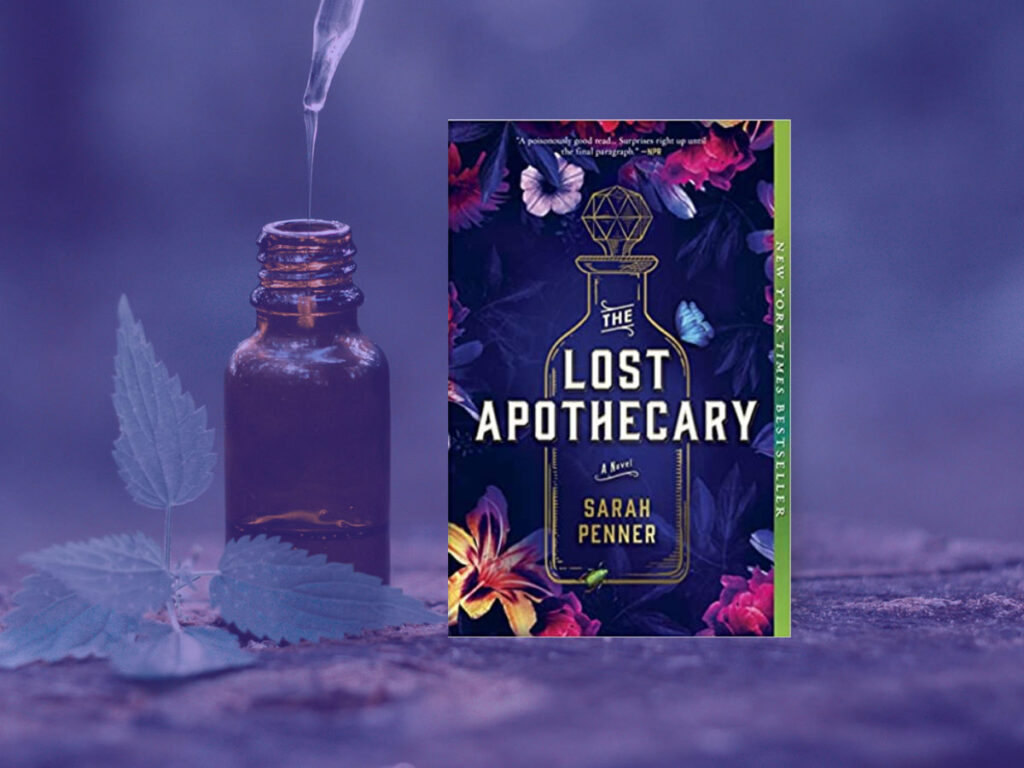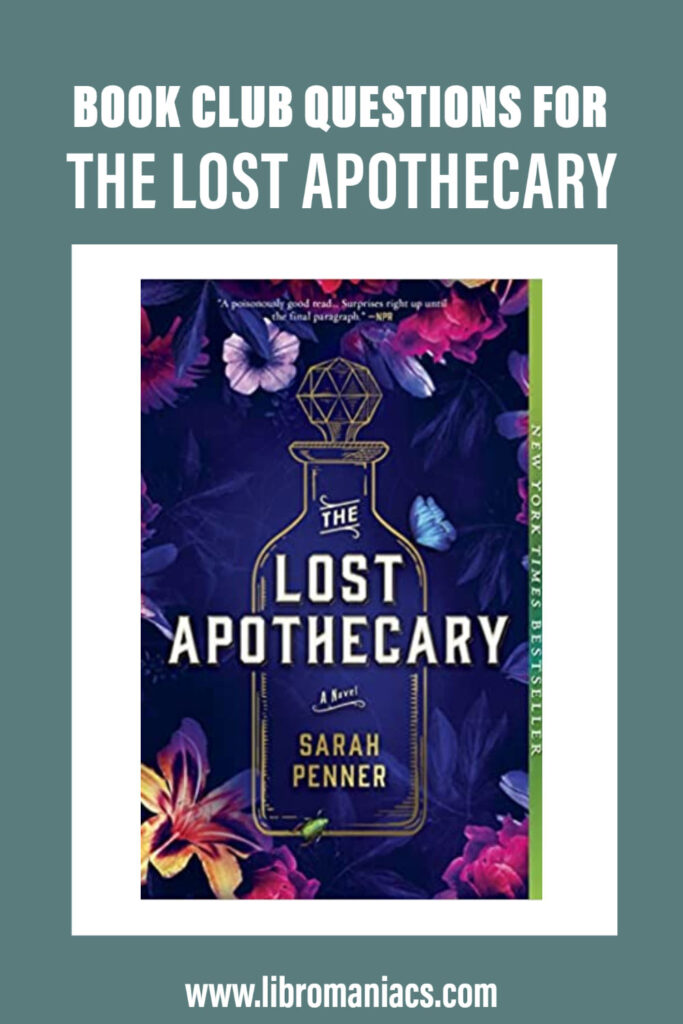If your book club enjoys getting lost in the dark alleys of history, Sarah Penner’s The Lost Apothecary is worth a visit. Though the book has been praised for its unique premise, some readers felt that the main characters weren’t strong enough to support the adventure story riding on them. What did you think? We’ll help you suss out that very question with your book club friends.
Despite its possible weaknesses, you’ll find many potent discussion ideas for The Lost Apothecary. The story swirls around themes of female solidarity, the consequences of revenge, and the pain of admitting what you really want.
Our guide includes The Lost Apothecary book club questions, designed to bring up all the aspects you loved (or hated) most about the story. We’ve also got a synopsis, and we’ve collected a few selected reviews of The Lost Apothecary, so readers around the world can chime in on your discussion.
If, in the end, you decide you loved the book, scroll to the bottom of this guide for 3 suggested books like The Lost Apothecary.

(This article contains affiliate links. This means that if you choose to purchase, I’ll make a small commission.)
The Lost Apothecary Synopsis
The Lost Apothecary, Sarah Penner
Hidden in the depths of eighteenth-century London, a secret apothecary shop caters to an unusual kind of clientele. Women across the city whisper of a mysterious figure named Nella who sells well-disguised poisons to use against the oppressive men in their lives. But the apothecary’s fate is jeopardized when her newest patron, a precocious twelve-year-old, makes a fatal mistake, sparking a string of consequences that echo through the centuries.
Meanwhile in present-day London, aspiring historian Caroline Parcewell spends her tenth wedding anniversary alone, running from her own demons. When she stumbles upon a clue to the unsolved apothecary murders that haunted London two hundred years ago, her life collides with the apothecary’s in a stunning twist of fate—and not everyone will survive.
With crackling suspense, unforgettable characters and searing insight, The Lost Apothecary is a subversive and intoxicating debut novel of secrets, vengeance and the remarkable ways women can save each other despite the barrier of time.
10 The Lost Apothecary Book Club Questions
These questions have been tailored to this book’s specific reading experience, but if you want more ideas, we also have an article with 101 generic book club questions.
- Nella repeatedly tries to send Eliza away from her shop rather than exposing her to the dark secrets of adulthood. Do you think Nella was right to try to shield Eliza, or should she have accepted Eliza’s curiosity as a sign that she was ready to learn more about the adult world?
- Eliza’s mother describes London very romantically to her daughter before sending her to make her fortune there. Did anything about the book’s description of eighteenth century London surprise you? Do you think you would have liked to live there?
- Nella tells Eliza that she and her mother never attempted to perform magic because “saving lives with the gifts of the earth is as good as magick.” Do you agree with Nella? Do you think her statement holds true today, knowing what we do about the human body and medicine?
- Although Nella’s mother was also seduced and betrayed by a man, she did not choose to pursue revenge as Nella did when betrayed by Frederick. What was the difference between their situations? Why did Nella, despite her mother’s example, feel compelled to seek revenge?
- Several crucial plot points in The Lost Apothecary depend on miscommunications between the characters. For example, Eliza wouldn’t have brewed her “Tincture to Reverse Bad Fortune” if she had understood Mrs. Amwell or Nella’s explanation of menstruation sooner.
Did you find these miscommunications realistic? Has your life ever been altered by a misunderstanding?
- In order to unravel the full story of the killer apothecary, and everyone involved, Caroline makes a few miraculous leaps in logic. For example, she guesses that the closed door on Bear Alley might belong to the Apothecary and correctly interprets Eliza’s cryptic interview to mean she jumped off the bridge, and not Nella.
Do you think you would have been satisfied with the story if Caroline had not figured out all the details? Why do you think Eliza’s role in the story was important to Caroline?
- Initially, Nella hesitates to respond to Lady Clarence’s letter because she “[has] no interest in meddling in the motives of the wealthy.” Do you think Nella was correct in being suspicious of a wealthy client? Are wealthy people are more likely to have corrupt motives for murder?
- Why do you think Gaynor chose to support Caroline during the police interrogation? Do you think you would have supported an acquaintance under similar circumstances?
- Did you feel sympathetic towards James at any point during the novel? At what point (if any) did you lose sympathy for him? Do you think he and Caroline will remain separated permanently?
- At the end of the novel, Caroline concludes that her desire for a baby was a “disguise” for her lack of fulfillment in her home, job, and marriage. Do you think you could have been a disguise for anything in your parents’ lives? If you have children, do they disguise anything in your life?
- BONUS QUESTION: Was the dual storyline even necessary? Could this have been written as either a modern day marriage unraveling OR a historical novel about a secret apothecary?
Selected Reviews for The Lost Apothecary
“I always admit that I’m not a fan of history. Then I pick up a brilliant work of historical fiction, and I daydream about life as a historian. Right now, I’m imagining the atmosphere of 1790s London. This story immediately transports the reader into bustling streets, shadow covered back alleys, and dusty apothecary shelves. I’ve always found old, natural remedies of the past fascinating, so I enjoyed reading about that aspect of the book. I was completely drawn into Nella’s world.”
“There’s a magical atmosphere permeating the narrative and blending with ghostly, gothic overtones. You feel the chills, the goosebumps, the hairs standing up on the back of your neck and sense the impending danger. The use of language for Nella and Eliza is authentic as is the historical context. I like the contrast between then and now, which also demonstrates clearly that some things never change.”
“Here’s a quick rundown of the female characters in this book:
- Nella: Wishes she was pregnant.
- Caroline: Wished she was pregnant, spends majority of book thinking she is pregnant.
- Lady Clarence: Wants to murder her husband’s lover so she can get pregnant.
- Eliza: Is 12 and thankfully is not pregnant (but she does think her period is a ghost which I think deserves an honorable mention).
- Gaynor: Is actually a historian and is, of course, exempt from pregnancy and thoughts thereof.
Yikes…I would be willing to roll with this if it wasn’t such a high percentage of female characters and if it was examined or dealt with in any kind of thoughtful way. It is not. ”
“This is a disappointing read with implausible situations, melodramatic characters, and obvious contrivances. It often raises more questions than it answers. The emotions of the characters are unrealistic, so the characters themselves also seem unrealistic. Contradictions only add to the lack of believability. The drama in the story is heightened too artificially.”
“This book made me realize that I’m so tired of dual timelines. {[…] Most of the time, the historical part is more interesting and this was definitely the case here. I couldn’t relate to the characters and that’s ok but towards half of the book, I didn’t really care about the story and where it’s going. Sure, I wanted to know how the historical part ended, but Coraline was too weak of a character for my liking.”
3 Books Like The Lost Apothecary
If you are interested more about the hidden lives of women, check out our reader guides for Matrix (angry nuns during the time of Eleanor or Aquitaine), The Personal Librarian (JP Morgan’s curator who passes as White), or The Invention of Wings (Abolitionist sisters who can’t take it anymore). Or the multi-voice, dual timeline story in The Lost Bookshop and Weyward.
The links go to our discussion guides and there’s a synopsis for the book toward the top of the article.

The Miniaturist, Jessie Burton
Like The Lost Apothecary, this book pulls readers into a historical world (seventeenth century Amsterdam), which toes the line between sinister and charming. When newlywed Nella receives a dollhouse from her husband, she orders miniature dolls and furniture to fill out. The items she receives in the mail from the Miniaturist bear an eerie similarity to her real surroundings–then they begin to expose secrets no one outside the house should know. Nella scrambles to solve the mystery of the Miniaturist, while dodging danger and doomed romance in her own house.

The Birth of Venus, Sarah Dunant
Another work of historical fiction, The Birth of Venus by Sarah Dunant steps out of the shadows of northern Europe and follows an ambitious young woman through the sunny streets of Florence. Like Caroline in The Lost Apothecary, Alessandra is expected to marry and raise a family rather than pursuing her passion: painting. When a young artist arrives at her father’s house to paint the walls of the local chapel, Alessandra has an opportunity not only to delve into her passion for art but to give in to her passion for the artist himself.

A Fierce and Subtle Poison, Samantha Mabry
While The Lost Apothecary leaves the effects of its “magick” open to interpretation, Samantha Mabry’s A Fierce and Subtle Poison fully commits to its own magic. Which in this case, is a magical curse trapping a green-skinned girl inside a hidden garden in Puerto Rico. If you developed a taste for powerful plants in The Lost Apothecary, you’ll be happy to find them flourishing in A Fierce and Subtle Poison as well. Just remember: too much of a good thing can get dangerous!
Have a listen on Audible. Try audio books for free for 30 days.
Share these book club questions for The Lost Apothecary with your friends:

